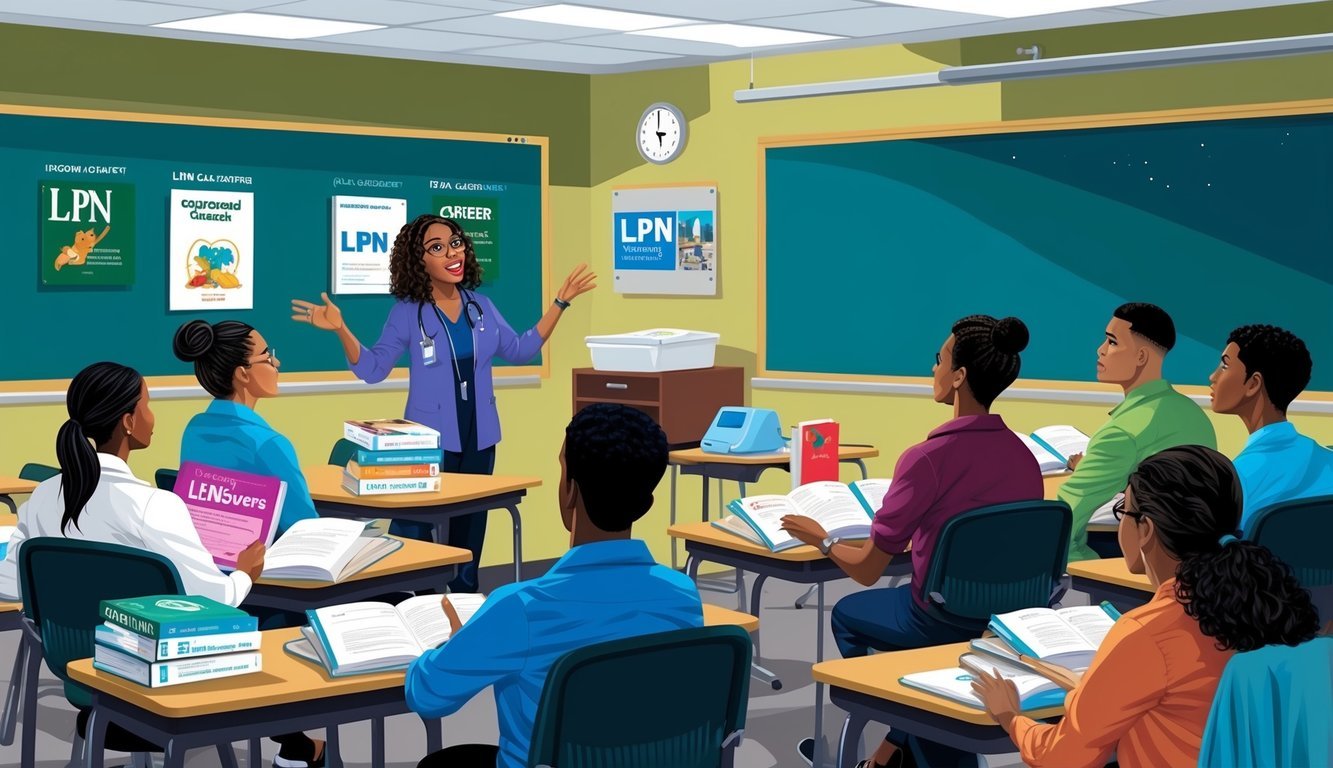Night classes for licensed practical nurse (LPN) programs offer a flexible pathway for those pursuing a career in nursing.
Many individuals find it challenging to attend traditional daytime classes due to work or family commitments. Enrolling in night classes allows you to balance your education with other responsibilities while still working toward your goal of becoming an LPN.
These programs provide essential training in practical nursing and set you on the path to earn your nursing license.
With a mix of classroom learning and hands-on experience, you will gain the skills needed to succeed in healthcare settings.
The unique timing of night classes allows you to stay engaged in your current job or personal life while advancing your education.
If you’re thinking about starting a career in nursing, exploring night classes might be the right choice for you.
Whether you’re interested in practical nursing or looking to expand your nursing education, these programs provide the support you need to thrive professionally.
Key Takeaways
- Night classes for LPN programs offer flexible scheduling options.
- Practical nursing education includes essential hands-on training.
- Becoming a licensed practical nurse opens various career opportunities.
Exploring LPN Career Prospects

As a licensed practical nurse (LPN), you have access to a variety of roles and responsibilities that can lead to many job opportunities in healthcare.
Understanding what these roles entail, the employment landscape, and the importance of licensure can help you navigate your career path effectively.
Understanding LPN Roles and Responsibilities
Licensed practical nurses play a vital role in healthcare.
You provide essential nursing care under the supervision of registered nurses (RNs) or physicians.
Your daily tasks may include monitoring patient health, administering medication, changing dressings, and assisting with personal care.
LPNs often work in various settings, such as hospitals, nursing homes, and outpatient care facilities.
Your ability to handle different patients and tasks makes you a valuable team member in healthcare services.
Employment Opportunities in Healthcare
The demand for LPNs is on the rise.
According to the Bureau of Labor Statistics, job opportunities for LPNs are expected to grow by 9% from 2020 to 2030, which is faster than the average for all occupations.
You can find job openings in various environments, including:
- Hospitals
- Rehabilitation centers
- Home healthcare services
- Long-term care facilities
This diversity in employment options allows you to choose a path that fits your interests and lifestyle.
The Importance of LPN Licensure
Obtaining your LPN licensure is crucial for your career.
To become licensed, you must complete an accredited practical nursing program and pass the NCLEX-PN exam.
This licensure not only validates your skills but also opens up better job opportunities and higher earning potential.
The average salary for LPNs varies by location and experience.
On average, you can expect to earn about $48,000 per year, but salaries can range from around $36,000 to over $60,000, depending on your role and where you work.
Investing time in your education and licensure ensures a more successful and rewarding career in nursing.
LPN Program Fundamentals

To become a Licensed Practical Nurse (LPN), you need to understand the core elements of the LPN program.
These include the program structure, necessary coursework, clinical experiences, and admission requirements.
Overview of Practical Nursing Programs
Practical nursing programs generally offer a combination of classroom instruction and hands-on training.
You can choose between a diploma program or a certificate program, depending on your career goals and the time you have available.
Most programs last about 12 to 18 months.
During this time, you’ll cover essential topics like anatomy, pharmacology, and nursing ethics.
The program prepares you for the National Council Licensure Examination for Practical Nurses (NCLEX-PN), which you must pass to become licensed.
Some schools, like BMCC, offer evening programs, allowing you to balance work and study.
Coursework and Clinical Experiences
In your LPN program, coursework is vital but equally important are clinical experiences.
You will participate in hands-on training at healthcare facilities, giving you real-world exposure.
Core courses often include:
- Nursing fundamentals
- Patient care
- Pharmacology
- Mental health nursing
You may also learn to care for patients in different settings, such as hospitals or nursing homes.
Clinical rotations typically account for about 30% of your program.
These experiences help you develop critical skills, such as communication, teamwork, and patient assessment, making you job-ready upon graduation.
Admission Requirements for Prospective Students
To enter an LPN program, you generally need a high school diploma or equivalent.
Some programs also require you to complete prerequisite courses, like biology and psychology.
Many schools have competitive admissions.
You may need to maintain a minimum GPA in your prerequisite courses.
Additionally, standardized tests, such as the HESI A2, may also be required.
Financial aid options are available to help manage tuition costs, which vary between programs.
Be sure to explore grants, scholarships, and loans, as these can significantly ease your financial burden.
The Pathway to Nursing Licensure
Becoming a licensed practical nurse (LPN) involves a structured pathway that includes preparing for the NCLEX-PN examination, navigating state licensing requirements, and pursuing continuing education for career advancement.
Each step is crucial to ensuring that you are ready for a fulfilling career in nursing.
Preparing for the NCLEX-PN Examination
To become an LPN, you must pass the NCLEX-PN examination.
This test is designed to assess your knowledge and skills in practical nursing.
-
Eligibility Requirements: Ensure you have completed an accredited practical nursing program. A high school diploma or equivalent is necessary, along with relevant coursework.
-
Study Resources: Utilize study materials such as textbooks, practice exams, and review courses. The National Council of State Boards of Nursing (NCSBN) offers resources that can assist in your preparation.
-
Exam Format: The exam includes multiple-choice questions and may have alternate formats, such as fill-in-the-blank or ordered response. Familiarize yourself with the test format to improve your confidence.
State Licensing and Examination Pass Rates
After passing the NCLEX-PN, you need to apply for licensure through your state’s nursing board, like the New Jersey Board of Nursing.
Each state has its requirements and processing fees.
-
Licensure Process:
- Submit your NCLEX-PN results.
- Provide proof of your education.
- Complete a background check if required.
-
Pass Rates: Understanding NCLEX-PN pass rates in your state can give you insight into how well graduates are performing. For example, as of 2023:
State Pass Rate New Jersey 88% Texas 90% California 85%
Check your state’s statistics for the most current figures.
Continuing Education and Advancement
Once you are licensed, you may want to consider continuing education.
This is often required to maintain your license and to keep your skills current.
-
Educational Opportunities: Look for courses that offer specialized training or bridge programs such as LPN to RN transitions. Enrolling in these programs can enhance your career prospects and increase your earning potential.
-
Professional Development: Engage in workshops, certifications, and conferences. These can provide you with valuable skills and networking opportunities.
Financial Considerations and Support

Navigating the financial aspects of your LPN education is crucial.
You should consider tuition costs, potential financial aid, and scholarship opportunities available to ease your financial burden.
Assessing Tuition and Fees for LPN Programs
Tuition for LPN programs can vary significantly based on the school and location.
Here’s what you might typically encounter:
| Type of Institution | Estimated Tuition Range |
|---|---|
| Community Colleges | $4,000 – $20,000 |
| Private Vocational Schools | $10,000 – $30,000 |
| Public Universities | $8,000 – $25,000 |
Additional fees may include application fees, lab fees, and costs for uniforms or equipment.
Be sure to inquire about these charges when you apply.
Understanding these costs upfront can help you budget effectively for your education, so reach out to the admissions office for a detailed breakdown of what to expect.
Exploring Financial Aid and Scholarship Options
There are several financial aid options available for LPN students.
You can start by filling out the FAFSA form to determine your eligibility for federal aid.
Consider applying for the following:
- Federal Grants: These do not need to be repaid.
- State Aid Programs: Many states offer financial assistance for nursing students.
- Scholarships: Various organizations provide scholarships. Some options include the Nursing Student Loan Forgiveness Program and local healthcare foundations.
Research workforce development programs in your area.
They often provide funding or support services for LPN students.
By exploring these options, you can significantly reduce the financial burden of your education.
Night Classes for LPN Programs

Night classes for LPN (Licensed Practical Nurse) programs offer flexibility for those balancing work and education.
These programs are designed for individuals seeking to advance their careers in nursing while managing other commitments, making them a popular choice.
Balancing Work and Education
You may find that balancing work and education requires careful planning.
Night classes typically run Monday through Thursday, allowing you to work during the day.
This schedule can help you maintain your job while pursuing your LPN degree.
Consider what options fit best with your current job.
Some programs also offer weekend classes.
This flexibility can make it easier to manage your time effectively.
Be sure to communicate with your employer about your school schedule, as they may offer support through flexible hours.
Night Program Structures and Schedules
Night LPN programs generally feature a mix of classroom instruction and hands-on training.
Courses often include essential topics like patient care, pharmacology, and nursing fundamentals.
You can expect classes to begin around 5:30 PM and finish around 10:00 PM.
Additionally, these programs often include simulated lab experiences, allowing you to practice nursing skills in a controlled environment.
Some schools may also provide tutoring to facilitate learning.
Here’s a sample schedule for a typical night LPN program:
| Day | Time | Activity |
|---|---|---|
| Monday | 5:30 PM – 10:00 PM | Classroom Instruction |
| Tuesday | 5:30 PM – 10:00 PM | Simulation Lab |
| Wednesday | 5:30 PM – 10:00 PM | Classroom Instruction |
| Thursday | 5:30 PM – 10:00 PM | Clinical Skills Practice |
Institutions Offering LPN Night Classes
Many institutions offer night classes for LPN programs.
Here are a few notable options:
- Jersey College provides a comprehensive program with evening classes and strong support systems. This includes tutoring and lab experiences.
- Eastwick College offers flexible scheduling to accommodate working students. They also have a focus on practical skills.
- Holy Name Medical Center also has night program options, including hands-on clinical training.
Researching each school’s offerings can help you find the right fit for your needs.
Explore their websites for specifics on when classes are held and other essential details.
Frequently Asked Questions

This section answers common questions about night classes for LPN certification.
You can find information about accredited programs, duration, prerequisites, costs, and curriculum comparisons.
What are the best accredited night classes for LPN certification?
You can find accredited night classes for LPN certification at various community colleges and technical schools.
Some programs you may consider include those at local institutions that are approved by the National League for Nursing (NLN) or your state’s nursing board.
Researching local options will help you identify the best fit for your needs.
How long does it typically take to complete an LPN program through evening classes?
Evening LPN programs generally take about 16 to 18 months to complete.
This duration may vary based on the specific program and how many courses you take each term.
Flexibility in scheduling is often beneficial for working students.
What are the prerequisites for enrolling in an LPN evening program?
Prerequisites for LPN evening programs typically include a high school diploma or GED.
You may also need to complete specific courses, like biology and chemistry, before admission.
Some programs may require a standardized entrance exam as well.
Are there any online LPN programs that offer night classes for working individuals?
Yes, some online LPN programs do offer night classes.
These programs allow you to balance your studies with a work schedule.
Look for programs that provide flexible hours and a blended learning approach, which combines online coursework with clinical experience.
What is the cost range for night LPN programs in the state of Kansas?
In Kansas, night LPN programs can range from approximately $10,000 to $30,000.
The cost often depends on the institution and the length of the program.
Be sure to consider additional fees like books, uniforms, and clinical supplies.
How does the curriculum of night LPN programs compare to traditional daytime programs?
The curriculum for night LPN programs usually mirrors that of traditional daytime programs.
You will cover similar topics, including patient care, nursing fundamentals, and clinical skills.
The main difference is the scheduling, which allows you to study while working during the day.

